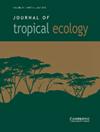缅甸商业人工林中竹子与树木的空间关联
IF 1
4区 环境科学与生态学
Q4 ECOLOGY
引用次数: 0
摘要
摘要竹主要分布在亚热带到热带地区。竹子提供了大量的生态系统服务,而竹子的扩张对森林生态系统产生了负面影响。尽管竹子对森林生态系统产生了巨大影响,但人们对竹子的生态特征仍知之甚少。在缅甸勃固山区的一个本地落叶树种商业人工林中,研究了三种竹的空间分布格局,这三种竹分别是:高竹、多形竹和麦哲兰竹。点过程分析揭示了每种竹子的聚集分布。对每对两个物种的分布重叠进行了分析。pergracile的分布与D.maclellandii和B.polymorpha的分布几乎没有重叠。在平缓倾斜的山脊上,全细头冠藻的数量明显更丰富,而在陡峭的斜坡上,麦勒兰藻的数量更丰富。斑竹没有表现出这些与地形有关的图案。C.pergracile和D.maclellandii的排他性分布至少部分可以由该物种相反的地形偏好来解释。虽然多晶白粉菌往往在大树上发现,但在远离遮荫的大树上往往可以发现,这表明多晶白白粉菌可能比薄叶白粉菌更耐荫。耐荫性的差异可能导致该物种的排他性分布。本研究中获得的栖息地偏好信息将有助于缅甸健全的竹子管理实践,并通过在森林中创造有利的栖息地来增加竹子种群规模。本文章由计算机程序翻译,如有差异,请以英文原文为准。
Spatial association of bamboos with trees in a commercial tree plantation forest in Myanmar
Abstract Bamboos are mainly distributed in subtropical to tropical areas. Bamboos provide numerous ecosystem services, while the expansion of bamboo gives negative impacts on forest ecosystems. Despite big impacts of bamboos on a forest ecosystem, ecological characteristics of bamboo remain poorly understood. The spatial distributional patterns of three bamboo species, Cephalostachyum pergracile, Bambusa polymorpha, and Dinochloa maclellandii, were studied in a commercial tree plantation of native deciduous tree species in the Bago Mountains, Myanmar. A point process analysis revealed a clumped distribution for each bamboo species. The distributional overlapping of the species was analysed for every pair of two species. The distribution of C. pergracile was little overlapped with those of D. maclellandii and B. polymorpha. Cephalostachyum pergracile was significantly more abundant on gently sloping ridges, whereas D. maclellandii was more abundant on a steeply sloping site. Bambusa polymorpha did not show these patterns with topography. The exclusive distribution of C. pergracile and D. maclellandii may be, at least partly, explained by the opposite topographic preferences of the species. Cephalostachyum pergracile tended to be found far from large trees that cast shade, although B. polymorpha tended to be found with large trees, suggesting that B. polymorpha may be more shade tolerant than C. pergracile. The difference in shade tolerance may contribute to the exclusive distribution of the species. The habitat preference information obtained in this study will contribute to sound bamboo management practices in Myanmar and enable bamboo population sizes to be increased through creation of favourable habitats in forests.
求助全文
通过发布文献求助,成功后即可免费获取论文全文。
去求助
来源期刊

Journal of Tropical Ecology
环境科学-生态学
CiteScore
2.10
自引率
0.00%
发文量
44
审稿时长
18-36 weeks
期刊介绍:
Journal of Tropical Ecology aims to address topics of general relevance and significance to tropical ecology. This includes sub-disciplines of ecology, such as conservation biology, evolutionary ecology, marine ecology, microbial ecology, molecular ecology, quantitative ecology, etc. Studies in the field of tropical medicine, specifically where it involves ecological surroundings (e.g., zoonotic or vector-borne disease ecology), are also suitable. We also welcome methods papers, provided that the techniques are well-described and are of broad general utility.
Please keep in mind that studies focused on specific geographic regions or on particular taxa will be better suited to more specialist journals. In order to help the editors make their decision, in your cover letter please address the specific hypothesis your study addresses, and how the results will interest the broad field of tropical ecology. While we will consider purely descriptive studies of outstanding general interest, the case for them should be made in the cover letter.
 求助内容:
求助内容: 应助结果提醒方式:
应助结果提醒方式:


